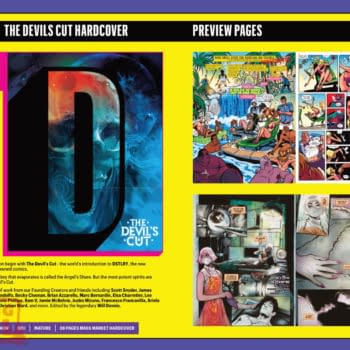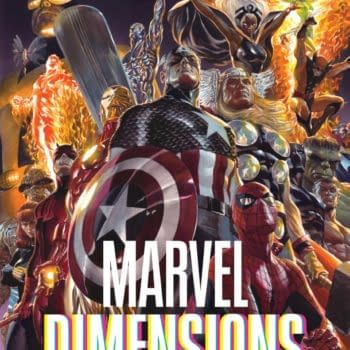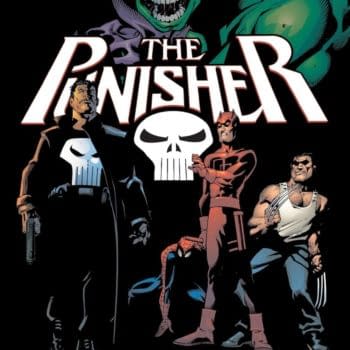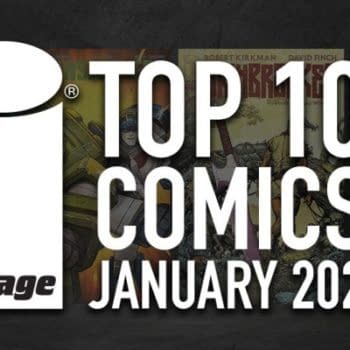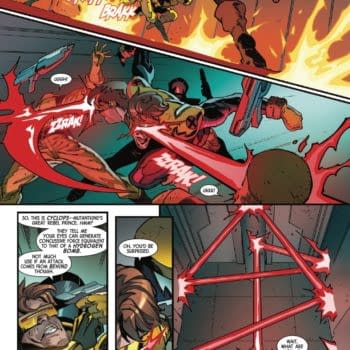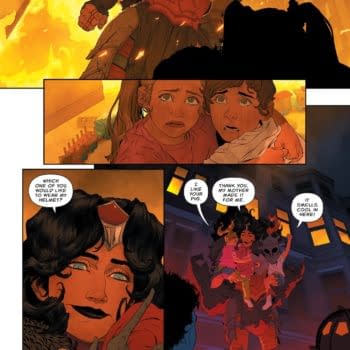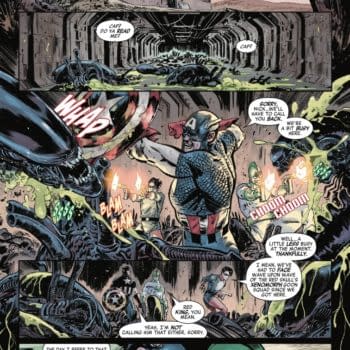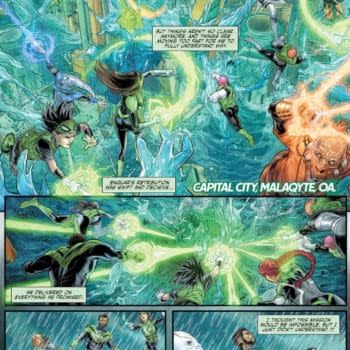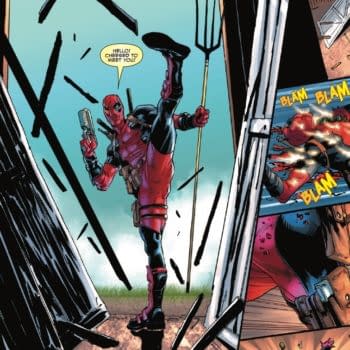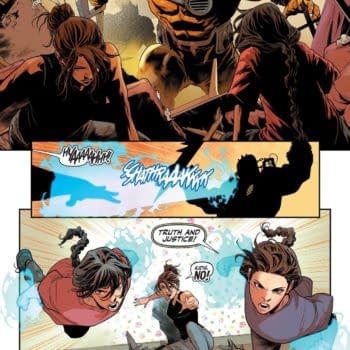Posted in: Comics, Recent Updates | Tagged: Comics, dark horse, ripd
Getting RIPD With Jeremy Barlow
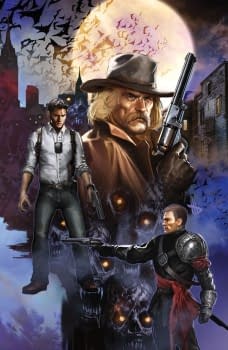
R.I.P.D. (Rest In Peace Department) comes to a movie theater near you this July. The film is based off the original comic by Peter M. Lenkov. In anticipation for the film (starring Ryan Reynolds, Kevin Bacon, and Jeff Bridges) Dark Horse Comics is releasing a prequel to the original comic called R.I.P.D. City of the Damned. The comic is written by Jeremy Barlow and features the art of Tony Parker. I had a chance to chat with Barlow about the upcoming release of R.I.P.D. City of the Damned along with his advice for writers and his work for Dark Horse.
You are somewhat picking up where Peter M. Lenkov left off, same premise but different story. How do you feel your version is going to be different from the original?
It's the same in that both stories exist within the cool world that Peter Lenkov created, and we follow some of the same characters, but where Peter and original series artist Lucas Maragnon introduced the Rest in Peace Department concept through their character Nick Cruz's eyes, artist Tony Parker and I get to dig a little deeper into the RIPD's history and mythology. We're expanding the scope. I'm staying true to Peter's vision for this world, but looking at it through my own lens.
What attracted you to this project in the first place?
It hit all the right buttons from the get-go. Editor Patrick Thorpe had previously teamed Tony and I up for a spot in his Robert E. Howard's Savage Sword anthology—we did a twisted western story in there that was an absolute blast. None of us knew it at the time, but it was a test run for RIPD: City of the Damned.
When Patrick approached me about doing this project, the idea of doing a prequel to the film came up almost immediately, and I saw a chance to take everything I love—historically inaccurate European westerns, sinister and absurd characters, crazy-scary monsters, archaic religious symbolism, and wholly unique worlds—put them all together, and use them to explore themes that are important to me. Peter's RIPD world is perfect for this, so open-ended and fun, and both he and Patrick let me go crazy in it. I couldn't say no.
That, and Patrick and Tony are two of my favorite guys in the biz, too, so I'd have jumped on anything to collaborate with them again. It just worked out that the next thing was the book I was born to write.
This is a prequel to the original work (and movie.) Do readers have to be versed in Lenkov's work to understand your version? Do you hope to inspire people to go out and read the original?
No previous knowledge is necessary to jump into City of the Damned. Peter's original concept is strong and easy to grasp, so we can drop right into the world as it's running. There's a lot of exposition in the preview pages, but those are pulled from the middle of the first issue—which otherwise starts and ends with a bang.
That said, I do hope people seek out the original graphic novel, which is not only the basis for the upcoming film but also a blast in its own right. Great story, great art. You can't go wrong.
Were you aware that R.I.P.D. was going to be a motion picture when you took on the project? If so, how did that affect your attitude towards the comic? If not, how did you feel when you found out it was going to be a movie?
Yes. The movie's been in production for a while, long before we cooked up City of the Damned, so that was always in the back of my mind. Still, I approached it like I do every script I write—what's the best, most unique and compelling story to be told here? I wanted to create something that could stand on its own, yet add something to the movie when both are taken together. When you do licensed books like this, you're careful not only to stay true to the property, but to find new ways of looking at it; something new and interesting to say about it. Peter Lenkov has been involved every step of the way on this one, but he's also given us a lot of autonomy and let us run wild. It's the ideal work-for-hire situation, honestly.
You have done a lot of work for Dark Horse. Is Dark Horse your home or do you have any plans to work with other publishers?
Dark Horse is family. They're an amazing company staffed with some of the coolest people in the industry, and I enjoy working with them. They've been really great to me. That said, I have been branching out a little bit—Dustin Weaver and I did a short story (another effed-up western) called "They'll Bury You Where You Stand!" for Image Comics' second Outlaw Territory anthology, and I've been involved with the stunning Hawken project over at Archaia, which will launch big in 2013. Beyond that, I've been slowly pulling together some original, creator-owned projects and I'm not sure yet where those are going to land.
You have done somewhat long runs in the Star Wars and Mass Effect universes. What attracts you to the sci-fi genre?
I just love that kick-ass, go-anywhere, do-anything type of storytelling that you can only do with science fiction. The crazier the better. With sci-fi you get to create your own worlds, write your own rules—and the farther out you go, the more human you can be. Which is a bit ironic, but it always holds true.
That, and real world research bores the hell out of me. I'm much more interested in emotional honesty than I am in historical or geo-political accuracy. I'd rather just make something up and maintain the momentum.
What advice do you have for writers trying to break into the comic book industry?
Worry more about being "good" than "getting hired"—because if you're talented and you've honed your craft, the work will come to you. That's a long view to take, and not what you want to hear when you're starting out, because honing that craft takes a long, long time, and you've got to burn a lot of crap out of your system before you start hitting the quality. But you're better off in the long run. If you're conscious of who you are and hold yourself to a high standard, you'll recognize what you're doing at first is crap and be tempted to quit. Don't. Professional writing is a lot like professional sports. You don't get to wear the jersey because you played a few games in school, or because you're the team's biggest fan. You eventually get paid to take the field after putting in hundreds or thousands of hours of your own time, at nights and on the weekends, until you're so good they can't not sign you. Again, it's a long view, but it's worth it.
It also helps to know who you are and what you have to say; to know what your perspective on life is. This is also a long process and changes as you go, but if you know what kind of writer you are and who you want to be, your path ahead is a lot clearer.
After that, just make comics. With digital, there's nothing stopping you from finding an artist and another hungry creative soul, and getting your work out there. Start small—8, 12, 16-page stories—and go for it. When you become good, you'll get noticed.
R.I.P.D. seems to have a bit of religious theme to it with references to "doing God's work." Are religious elements going to play a large roll in the series?
Absolutely. Our main character Roy is a guy who lived his life, trying to do the right thing even if it didn't always work out that way, and hoping that his mostly-good intentions would be enough to earn him a heavenly reward in the afterlife. When he dies, things don't quite go to plan. He's partnered with a Puritan named Crispin Mather, whose worldview is a bit…intense, and those two different perspectives don't run parallel.
I don't want to spoil anything, but by the time we reach the titular City of the Damned, both characters' beliefs are profoundly tested. On the surface, we're doing a horror/comedy/western, but we have some big ideas at play in the story. Which is just how I like it.
How much of the series do you have planned out?
We have this first story and a little something extra that'll be announced later. After that, it'll depend on how well people respond to what we're doing. This world is rich and we can go in almost any direction we want with it, and I'm ready to keep it rolling. I will say, humbly, that writing this series is some of the best work I've done, and Tony is just killing it on the art. That guy's a superstar in the making.
Where you able to do any set visits during filming? If so, did they give you any ideas for your story?
No set visits, unfortunately. Aside from talking with Peter Lenkov throughout the process, we've remained independent of the film production. Which, to be honest, is how I like to work. That said, I'm an enormous fan of everyone involved with the film, and I look forward to seeing it. I hope they like what we're doing over in the comics, and that I get to meet some of them on the convention circuit next year.






